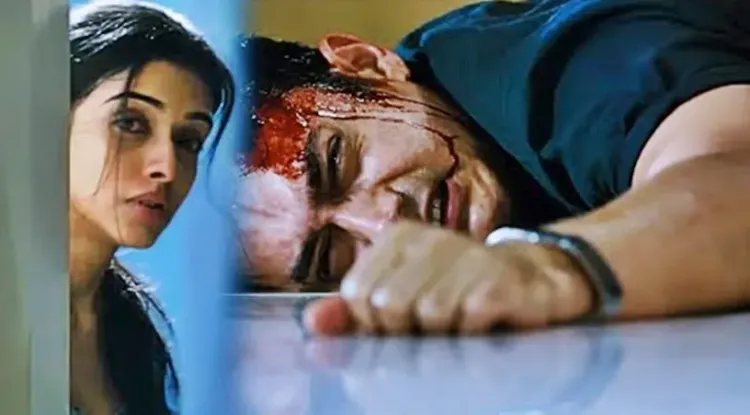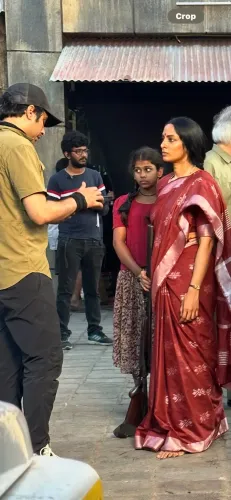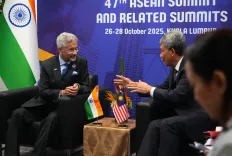The Tragic Fate of Kalpana in 'Ghajini': Unveiling the Mystery Behind Her Death

Synopsis
Key Takeaways
- Kalpana's death leaves a lasting impact on audiences.
- Director A.R. Murugadoss explains the narrative choices.
- The film explores themes of identity and revenge.
- Creating action sequences requires careful thought.
- Collaboration with superstars presents unique challenges.
Mumbai, March 19 (NationPress) A whole generation of movie enthusiasts was left emotionally shattered when they entered cinemas in 2008, only to find that the character of Kalpana (portrayed by Asin) in ‘Ghajini’ met her end without ever uncovering the real identity of her love interest, Sanjay Singhania (played by Aamir Khan).
For millennials who relish the thrill of mainstream cinema, this remains a deep scar that has yet to heal. Emotional Reels on Instagram express sentiments about how Kalpana's demise without recognizing who Sanjay was, is one of the most tragic elements for his character.
IANS had a conversation with director A.R. Murugadoss prior to his upcoming film, the Salman Khan-starring ‘Sikandar’, and posed the pivotal question, hoping for an inside scoop. He did indeed break down the scene, explaining how the hidden truths fueled Sanjay's quest for revenge, setting a gripping revenge-narrative into motion.
Regarding this, the director shared with IANS, “When I initially crafted the script, I pondered, ‘What if Kalpana discovers he is actually Sanjay? How would she respond?’. I concluded that adding this detail would dilute the intensity of Sanjay's desire for vengeance against Ghajini.”
In the film, Kalpana even provides financial support to Sanjay before she is brutally killed by ‘Ghajini’. This act profoundly impacts Aamir’s character. The director cleverly utilized Kalpana’s naivety as a tool to enhance the emotional depth for the viewers.
The director went on to explain, “Sanjay had so much he wished to reveal to her, to disclose his identity, but he could not do so because Kalpana passed away before he could inform her, and he also suffered from short-term memory loss following that incident. These two elements intensify his drive for revenge, rendering it more authentic.”
A.R. Murugadoss then redirected the discussion, posing a thought-provoking counter, stating, “If Kalpana had learned the true identity of Aamir’s character, we wouldn’t be discussing this scene today. It’s been 16 years since the film’s release, yet it remains a topic of conversation. As a writer and director, I consider that a success.”
A.R. Murugadoss has collaborated with some of the most prominent stars in Indian cinema, including Ajith Kumar in ‘Dheena’, Chiranjeevi in ‘Stalin’, Suriya and Aamir Khan in ‘Ghajini’ (both Tamil and Hindi versions), Thalapathy Vijay in ‘Thuppakki’, Akshay Kumar in ‘Holiday: A Soldier Is Never Off Duty’, and now with Salman and Rashmika Mandanna in ‘Sikandar’.
While it may appear to be a dream-like filmography featuring all these superstars, managing such significant names raises the stakes. How does he handle the complexities of working with these luminaries?
The director shared with IANS, “With superstars, we are tasked with meeting their fans' expectations and the box office. Thus, we cannot disappoint the audience, nor can we present something typical. When working with major stars, as a filmmaker, you must align with their approach while adding a unique twist. This presents challenges. Some dialogues can be lengthy, so before filming, we discuss how to convey information succinctly.”
He also commented on how he orchestrates action scenes in his films, stating, “When preparing to shoot an action sequence, we need to ask, ‘What is the motivation behind this action?’ Is the hero fighting for his mother, sister, girlfriend, or someone else? Therefore, if something happens to the mother, the action will differ compared to how it would be for a friend, sister, or girlfriend.”
He continued, “Moreover, the timing of the action sequence is crucial; if it appears in the first half, it may not resonate as deeply with the audience. We cannot stage a climactic fight in the first half of the film. Additionally, the scene's mood is vital; if the atmosphere is well-established, even a simple slap can be impactful. Conversely, if the mood isn't appropriately set, the audience may lose interest.”
“I am fundamentally a writer and director, so I am more aware than anyone else. For a film I’ve penned, the groundwork begins six months to a year before the actor joins the project. I meet with the actor and narrate the story. I understand how my character will communicate, behave, and interact with others, because I am immersed in the narrative. If the hero deviates from this path, I must intervene to make adjustments,” he added.
Produced by Sajid Nadiadwala, ‘Sikandar’ is scheduled to premiere in theaters on March 28.









